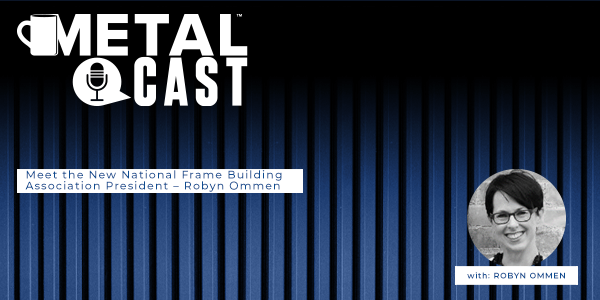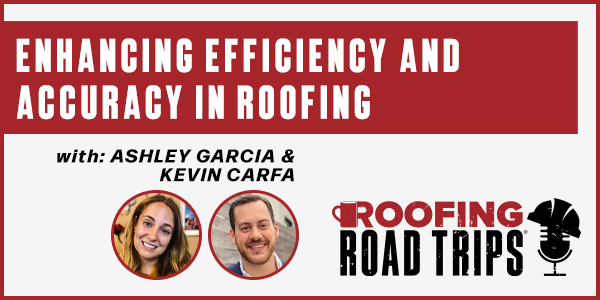Teresa Ramirez - The Real Cost of Labor - PODCAST TRANSCRIPT
May 6, 2025 at 9:00 p.m.Editor's note: The following is the transcript of a live interview with Teresa Ramirez of Southeast Contracting Services. You can read the interview below, listen to the podcast.
Intro: Welcome to Roofing Road Trips, the podcast that takes you on a thrilling journey across the world of roofing. From fascinating interviews with roofing experts to on-the-road adventures, we'll uncover the stories, innovations and challenges that shape the rooftops over our heads. So fasten your seat belts andjoin us as we embark on this exciting Roofing Road Trip.
Heidi Ellsworth: Hello and welcome to another Roofing Road trips from RoofersCoffeeShop. My name is Heidi Ellsworth and we are here today to talk about one of the biggest issues in roofing and that is skilled labor. anddo you really know the real cost of your labor? So we brought the expert and I'm talking expert in this area and that is Teresa Ramirez with Southeast Contracting Services, a very dear friend of mine and also a leading expert, really, when it comes to getting the right skilled labor andunderstanding what the costs are. So we're going to talk about that today. Teresa, welcome to Roofing Road Trips.
Teresa Ramirez: Thanks for having me, Heidi.
Heidi Ellsworth: I am so excited to have you here today. So let's start out with an introduction, if you can introduce yourself, tell us about your business.
Teresa Ramirez: Okay, I'm Teresa Ramirez. I have 20 years' experience working in the construction industry and my last 10 years we've been working specifically with the roofing industry.
Heidi Ellsworth: And tell us a little bit about what Southeast Contracting Services, what do you do?
Teresa Ramirez: Okay. Basically, what we do is we send people all over the nation. We send andwe fill the gaps of the construction industry. andin this time, we're talking about roofers. For example, if a company have a need to have additional skilled, unskilled laborers, we can send them to any location. Right now, we're working with some state, that's Minnesota, Georgia, Florida and of course Texas.
Heidi Ellsworth: Yes. andyou're sending skilled labor, very skilled labor all over the country to help out, to really fill in crews or even make up crews, right?
Teresa Ramirez: That is correct. Some of our people are skilled, some of our clients have already their skilled, or iented detail roofers and we send helpers top A, B and C helpers that can help them andsupport to work in the timeframe when the people need to have the work done. So basically, what we do is help them to get the job done in a timely manner.
Heidi Ellsworth: I love it, I love it. Well, let's talk about some of the hidden costs that contractors are facing when it comes to labor. Can you break down the expenses that contractors face and really what they're looking at when it comes to finding that real cost?
Teresa Ramirez: Yeah, so basically, when they send a bid, they think about material andall these costs that are direct, but thinking about the cost of labor, sometimes the contractors forget sometimes to put the additional andunforeseen costs, as, I don't know, the health insurance, pension, the 401(k), the union cost. In some states, as you know, Heidi, some of the states andcompanies has to have the union, so you need to think about also the union costs. Also, the variable overhead, which is vehicle expenses, tools, communication equipment, allocated overhead and also think about all the premium insurance you have to pay. So that's one of the things that are most important to take a look at.
The majority of the contractors that I talk, when I tried to understand what are the real costs as for the workers' compensation, when I'm in a convention, usually the owners don't know, because the accounting department or the bid people are in charge of it. But you as an owner, you need to know what your premiums are, to understand how much you are paying for the worker you have. Also, consider if you have had any accidents or something that... or , OSHA, let's talk about OSHA. OSHA, sometimes they audit you andyou have those audit, those crazy audits that you didn't realize that your premiums goes up because of those audits. or , sometimes a small accident gives you the premium raises, because there's something that you did not see. So that's one of the things that I suggest the most to the employers and the GCEs and the contractors to take a look at, so you will understand how much you're paying for your premiums.
Heidi Ellsworth: Yeah, because and all of these things, as you are covering a lot of this, as with your labor who is coming all over, you're taking care of a lot of those hidden costs that people are not aware of. andI think that's so important, how that also starts impacting the project's bottom line without people even noticing. So talk a little bit about that, just about... I love how you bring it down to project by project, because sometimes that's just such a great way... Sometimes contractors or any business, we think too big, right? But we need to bring it down, project by project. How do you share andhow do you kind of help the contractors with finding those labor costs andthe projects to keep their bottom line good, keep it profitable?
Teresa Ramirez: Yes, one of the things is since I'm not inside the project, because at the end of the day, we just provide laborers andskilled laborers, so but one of the things is I love to have open communication with our clients, because that's the only way that we can help them. We want to make a team. We're here for a partnership. We don't just send the workers and, "Whatever you do, it's not my problem." No. What we want to do is share our knowledge andbe very or iented detail of how much this will cost you andhow we can help to reduce those costs.
So one of the things is the per diem situation, the lodging situation, we help them to understand that the lodging costs, if you don't really take care of... Like, you can talk with the hotels, you can make deals with the hotels, you can make deals with the transportation. But there's details that are very important that you need to cover, because if you don't talk about that first when you make the bid andtry to get your subcontracting labor force, even if you're talking with the whole crew that you're going to hire, you need to talk to them about this, the small details, the per diem, the duration of the project, all this.
Because if you don't have open communications with them, they can think, "Oh, this is going to be just two to three weeks," andthen, no. It's very important to talk about the duration of the project, the type of material you're going to use when you're going to install [inaudible 00:07:54], EPDM, whatever it is. Also, talk about the tools, about all these details that, sometimes, as a contractor, you're focused to get the job done and with quality, but think about all these small details that, at the end of the day, will drain you and you're going to spend more money than you did not see.
Heidi Ellsworth: And that becomes even a bigger deal if it is a project that's out of town for the contractor or if it is a multi-state project. andyou already mentioned per diem andhousing, but there's also state-specific burdens, compliance, different things. So how do you help and what's some of your advice around really handling these big, multi-state projects or ones that are away from the main office?
Teresa Ramirez: Yes, one of the things that I see that the contractor struggles the most is when they have like two, three people in one room. You can never think this simple, small detail can put you in a tough situation or stress situation, because every person has their own background. So you never know if these two guys will fit in the room, if they're going to be okay, because little details put them in a hard position. andI'm talking about like, we can do a nightmare... Tell stories that I have heard about just two guys staying in the same room, one has a background that is different from the other.
So that's one of the things that you need to talk about, trying to get andcoordinate the workers you're going to send to any state. Also, consider that each state has their own rules, requirements, state laws and all this. So when you are sending people to other locations, for example, if you are in Minnesota andyou are sending people to Iowa or New York, the laws are different there.
Heidi Ellsworth: Yes.
Teresa Ramirez: So you need to read andunderstand what laws are, based on the state you're going to send the workers. Also, the insurance, you need to be aware that the insurance is different between one state andanother. Just make sure that your workers' comp covers the state that you're going to work with. andwe can talk about workers' compensation a lot, I've been through everything andI've learned so much about this.
Heidi Ellsworth: Well and that's where you are such a wealth of knowledge, because as you look at it, you're sending workers to so many states, so you have to understand all these states, which helps the contractors who are working with you, because you have this information already for them.
Teresa Ramirez: That is correct, Heidi. We've been working with some states and at the end of the day, what we try to do is follow the law, follow the insurance premiums, because at the end of the day, this can kill us if you do not do the right thing. It can kills your budget, it can kills your predictions andyour earnings. So basically, that's one of the things that you need to think of before sending the guys and of course, even before you send them the bid.
Heidi Ellsworth: Yeah, exactly. andreally working with you upfront on getting the labor you need. One of the things, Teresa, that we've talked about this before that is so cool about what you do is you can provide seasonal or full time, year round. But there's a lot of workers who are very happy to work seasonal andthen be back where it's warm during the winter. So you can go, you've been everywhere. Talk a little bit about the differences between seasonal workers, comparing that to year-round employees and kind of training, reliability. What's some of the differences?
Teresa Ramirez: First of all, one of the things that they need to consider is you don't have to pay full-time employees. So as I mentioned before, you will omit in your expenses the disability, the parent leave, the litigations, the unemployment benefits, just to talk a little bit about how much you will reduce the cost of your seasonal laborers. But also, the good thing is I'm not saying like, "Oh, you just need seasonal laborers." Of course, no, there's always pros andcons about having the seasonal.
If you want to have seasonal workers is when you have more jobs than you were expecting. Also, for the Midwest of mid-center, like Iowa andMinnesota, all the states that you cannot work all full, year round, you have your 20, 30, depending on the size of your company, the employees that you have. But if you have the peak load or the peak season will be, I don't know, May through September, then you can have the seasonal workers.
Heidi Ellsworth: Yeah, yeah, that makes sense. Well and I mean, when the snow's flying and that's all the northern states, that makes sense. I mean, there's such a great service there, to be able to have folks come up, work during the on season, but then not have to worry, then reduce your workforce during the snowy, cold part of the year.
When you're looking at different jobs and contractors right now are getting a lot of bids, they're starting to bid large jobs, whether it's government, schools, private, all the data centers that are out there, what are some of the things that they should be doing in talking with you on bidding? Because you just said this a little while ago andit really caught my attention, it's not when you're in the thick or in the middle of the project that you should be having these conversations. It's at the beginning, when you're bidding it anddoing the estimating. What's some of your advice there?
Teresa Ramirez: Yes, one of the things that I advise is that it's important to really look at any type of project, because as you know, military bases or government jobs requires additional requirements, has zero criminal background, clean record. andalso, it depends on states andfacilities. Some of the military bases requires US citizens, right, just US citizens. Some of the military bases requires permanent residents. So each facility has their own requirements. So you think about this before sending the base.
Also, public works, that's different. It's very important also to have zero criminal background. So each project has their own requirements and you need to think about that first. Also, think that people with zero criminal background and all that and skill requires more money. So the wages are way up than a regular residential or commercial project. So it's very important that you need to take a look, attention to that, because as I mentioned before, details are very important. andalso, I want to talk, when you send people to other states, for example, if you're from, I don't know, Texas and you're going to send workers to, I don't know, maybe South Dakota, think about, "Okay, we're going to send these workers andthey're going to be conducting some job up north." You need to think about how much you're going to pay for the workers' compensation in the state of South Dakota, okay?
And also, if you are from Iowa andyou have a project in Texas, think about, "Okay, we're going to send workers to Texas, to perform a specific job, commercial job," andyou need labor to finish that, so try not to take your labor to other states, because it's going to cost you so much money just to send the worker there. You need to pay per diem, you need to pay lodging accommodations, you need to pay a lot of things. So instead of doing that, try to get laborers from... For local laborers. At the end of the day, you're going to have your supervisor, your superintendents, your skilled workers there, making sure that your project will be quality.
Heidi Ellsworth: Yeah and that's really where Southeast Contracting Services comes in. You can bring those workers, you understand exactly what their backgrounds are, what their documentation is. You have everything verified, you handle everything, from housing, per diem, to everything. So tell us a little bit about how you can work with contractors to help them predict andmanage those real costs that we're talking about, so that they aren't hidden anymore. They're real costs and-
Teresa Ramirez: Yes.
Heidi Ellsworth: .. every project's profitable.
Teresa Ramirez: So basically, we need to talk before send them the bids. We need to talk about how big this project will be and for how long and when is going to be the super important, what of material they're going to use, so we can find the right people for the right job. That's one of our slogans, like the right people to the right job. So we need to see the background of all this, so we understand how we can work and we will give them our prices andsee, to try to understand andprovide the best information we can provide, in or der for them to get a good bid.
Heidi Ellsworth: Yeah. Now, you are located out of the Rio Grande Valley and you have such a wealth of talent and you draw talent from the area and then very excited to go across the United States, working. Just tell us a little bit about that, because I think that's important for everyone to know where these workers are living, where they're coming from and how it works, traveling throughout the season or full time during the year.
Teresa Ramirez: Yes, our workers are from here, from the Rio Grande Valley, but we do an extensive background check in the state of Texas. So before sending the guys, we run drug tests, face to face. So one of the things that is very important that people know is, especially recruiters, is that we just do not recruit by phone or by Zoom call, because at the end of the day, it's construction workers, we need to see them. They're going to be on the floor, so it's very important that we need to understand andsee their faces, face to face. We do face-to-face interview. We see them, we see how they react, if they're in good conditions, physical good condition to work.
We go to drug tests, not just once, but maybe two or three times, because we want to make sure that the guy will be sending will not fall from a roof, because in or der for Southeast to be competitive is that we have very unbeatable, good prices with our premiums, talking about the workers' compensations. So that's one of the best thing that we offer to our clients. andalso, we run the payroll. Our payroll, we pay every Friday. So the people are happy to receive their... Imagine, you're out of town and you just see your phone and you see on Friday morning, you see, "Oh, I got paid. I'm happy. I'm going to my job andI'm going to be happy." andif something comes up, nobody but us take care of pay. If hours are missing or something, we will fix it.
But the first thing is, before they leave, we talk all small details about the contract, the duration of the project, how the client is, the background, how the people are in the field. We got a very good introduction of every project we send our workers. So that's one of the best things, like, "Hey, you're going to be with these clients. These clients are this, this, this," trying them to understand their culture, their background, so they will-
Heidi Ellsworth: Love it.
Teresa Ramirez: Yes, they just, they never feel lost, because we also cover their feelings, how they feel, how they will be. We talk once a week with the superintendent or with the supervisor, like, "How Juan is doing?" So basically, we take care of both of them, client andemployee.
Heidi Ellsworth: Yeah, because you want them to come home safe andsound, too.
Teresa Ramirez: Of course and I also-
Heidi Ellsworth: Exactly.
Teresa Ramirez: ... want my clients to be happy with them,
Heidi Ellsworth: Right, right.
Teresa Ramirez: Both situations for us is very important. andall the things, all the workers that we send is, you see them in Spanish, but the majority speak both languages, Spanish andEnglish. They're bilingual, so that's very important. You see them like, "Oh, they're Mexicans." No, they're American citizen, but the people from this particular area, they have Hispanic heritage.
Heidi Ellsworth: Yes, beautiful Hispanic heritage. I love it.
Teresa Ramirez: Thank you, thank you.
Heidi Ellsworth: I just love it and the fact that you, I think it's really important for everyone to understand too, that you cover everything. You cover their per diem, you cover their housing, you cover their travel to get there and then everything that we've already talked about. So for the contractors out there who are bidding right now for their jobs to get everything going for this season, this is a real solution. We talk and Teresa, we talk a lot about the problem, but it's so awesome when we can do these podcasts, when we can have our conversations with real solutions. andwhat you bring to the industry is real solutions and advocacy for the industry and for the people in it. Our workers are the skilled talent, the contractors, so thank you so much. It's really an amazing thing.
Teresa Ramirez: Thank you, Heidi.
Heidi Ellsworth: Thank you. I tell you what, so for everyone out there, you can find this on RoofersCoffeeShop in their directory, where you can find their website that you can get directly to Teresa andher team. They're amazing. You should also, you'll find them at a lot of trade shows. We see each other there all the time. In fact, there's some great YouTubes where we've interviewed Teresa andteam in their booth. So check it out and really look at this as a solution for your labor shortages coming into new season. Teresa, thank you again for being here.
Teresa Ramirez: Thank you and I hope all this information, everybody take advantage of this information, because there's so much things that are going on that sometimes the people and we, even me, did not consider, like, I don't know, maybe eight years ago and now, since I've been through a lot of struggling and challenging situations, I mean, in this point right now, because all the burdens that I already, you know, [inaudible 00:24:17].
Heidi Ellsworth: Right. A wealth of knowledge to share with contractors-
Teresa Ramirez: Yes.
Heidi Ellsworth: ... so they can surpass some of those hidden costs, some of those mistakes up front-
Teresa Ramirez: Yes.
Heidi Ellsworth: ... by working with you. I think that's it, bottom line.
Teresa Ramirez: Yes and the thing is that I would also like to mention that we're going to have a webinar about the real labor costs, when we're going to show graphs, we're going to show a lot of information written, so the people can understand more about these burdens. I'm not telling that I am the expert andI know everything, but any tools that I can provide you andyou can look at, then maybe you can add that value to what you already have. You never never know, like small details. andalso, if you can share any information, would be amazing to spread the word andeverybody understand all this.
Heidi Ellsworth: Right, right. That is great and when is that webinar?
Teresa Ramirez: It's going to be May 20th and I think it's going to be at 9:00 AM. We will be sending the link, so everybody can take, it's free, so you can take this training and you understand a little bit more about how these... Like, with graph andvisuals, about how we can manage andsee. A lot of people are visual, so they need to see graphs, they need to see more information and we can definitely share this knowledge with them.
Heidi Ellsworth: I love it, I love it. So you can find that on the Southeast Contracting Services Directory, May 20th. We'll have a link on there. Teresa will get us all of that, so be sure to check that out. Thank you so much and it'll be on demand afterwards too, so if you don't hit the May 20th, I'm sure we'll be able to have a copy of that for you to watch on demand.
So thank you so much, Teresa and thank you everyone for listening. Be sure to check out, like I said, the Southeast Contracting Services Directory, to get more information and check out all of our podcasts under the Read Listen Watch navigation under Roofing Road Trips. Be sure to subscribe andset your notifications on your own favorite podcast channel, so you don't miss a single episode. We'll be seeing you next time on Roofing Road Trips.
Outro: If you've enjoyed the ride, don't forget to hit that subscribe button andjoin us on every roofing adventure. Make sure to visit RoofersCoffeeShop.com to learn more. Thanks for tuning in and we'll catch you on the next Roofing Road Trip.























Comments
Leave a Reply
Have an account? Login to leave a comment!
Sign In